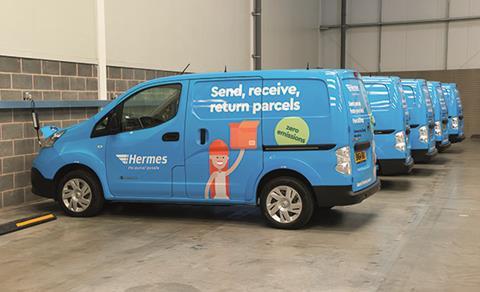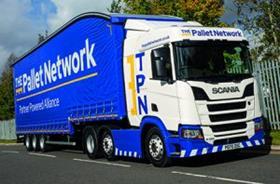
Hermes
Sustainability is at the forefront of Hermes’ operating model as it recognises the impact of its transport supply chain on the environment. To improve environmental performance within its trunking operations, in 2020 Hermes added seven new CNG vehicles, taking the total to 90 CNG tractor units.
The business is also trialling an industry-first 12-tonne CNG vehicle. In London’s Ultra Low Emission Zone, Hermes runs a fleet of fully electric vans to deliver parcels through its ParcelShop network and is looking to expand on this during 2021 with a trial of the new purpose-designed Volta electric vehicle.
Longer term, the business is planning to achieve year-on-year reductions in CO2 at parcel level by 5% and be carbon-neutral within its warehouses and infrastructure by 2030. It has also committed to measuring and managing its sustainability along with social and governance practices, as part of an updated ESG strategy.
Hermes has a dedicated senior team including stakeholders from finance, procurement, ops, fleet, client development and comms/PR reporting regularly regarding emissions network-wide. It is also developing robust KPIs, with a supporting monitoring and management process regarding environmental performance. All employees attend an induction programme where a broad sustainability overview is discussed, which is further enhanced when staff embark on professional qualifications or apprenticeships.
The judges said: “Leading the way on CNG tractor units and showing a great commitment to investment in alternative fuels and clean technology. Buy-in from management was strong. A clear, concise entry.”

Hovis
Hovis is committed to continually reducing the road carbon emissions of its fleet, which comprises around 400 vehicles and 250 trailers. Through the use of viable technology and new fuels, it pushes the envelope on customer collaborations to reduce delivery miles, whilst also encouraging and rewarding its fleet drivers to improve their on-road performance.
In 2015, Hovis set out its carbon-reduction strategy and road map for achieving its goals, with four key pillars underpinning the plans: reduce operating miles; improve MPG; reduce or remove the need to burn diesel fuel; and driver performance and data. Projects taking place in 2020 and 2021 aim to remove 1.3 million road miles from the operation. Initiatives include the introduction of a new 7.2-tonne ‘Convenience’ vehicle for urban deliveries, which have replaced 12-tonners and so far saved 35,000 gallons of fuel. Also the use of sustainable drop-in fuel HVO across the entire fleet has put Hovis on track to slash 40,311 tonnes of CO2 by 2022, or 91% per litre used compared with diesel.
Other projects have seen the rollout of Microlise technology across the fleet and creation of a driver behaviour strategy; introduction of two fully electric 7.5-tonne eCanters; and working with customers to improve routing efficiency and reduce mileage.
The judges said: “Very impressed that Hovis is using all the tools available to reduce road mileage as a key focus. Well-measured carbon reduction, good analysis and strong commitment to sustainability.”

The Pallet Network
Pallet networks last year delivered 28 million pallets in total, with TPN delivering 4.6 million. Every pallet network partner accumulates broken and worn-out pallets which are no longer usable, not only from their network operations but from warehousing and general haulage operations. Their choices are sending pallets to landfill or burning them, neither of which offers a sustainable option.
TPN created an environmentally sound, carbon-neutral system for end-of-life pallets, which is free to all partner companies to use. Partners are encouraged to use any empty trailer space to bring their broken and expired pallets to the hub as part of their normal trunking operations. The scheme therefore creates no more carbon through additional mileage.
The pallets are sorted at the hub and those which can be upcycled (fixed for re-use) are salvaged and repaired. The remaining pallets are added to a standing trailer for collection by Stobart Energy. Full trailers of pallets are taken away and suitable wood is recycled to make MDF products, and the remainder fuels carbon-neutral energy production.
TPN’s recycling scheme began in July 2020 and partner buy-in has grown rapidly. The first month TPN recycled 16 tonnes, but by March 2021, it recycled 65 tonnes. In total, the scheme has saved 364 tonnes of wood waste from local landfills or burning. This is expected to reach in excess of 500 tonnes for the first year of operation. In addition circa 10% of pallets are salvaged for re-use.
The judges said: “Great sectorial leadership – a sustainable strategy that could be shared with wider industry. An influential scheme and an innovative approach.”











